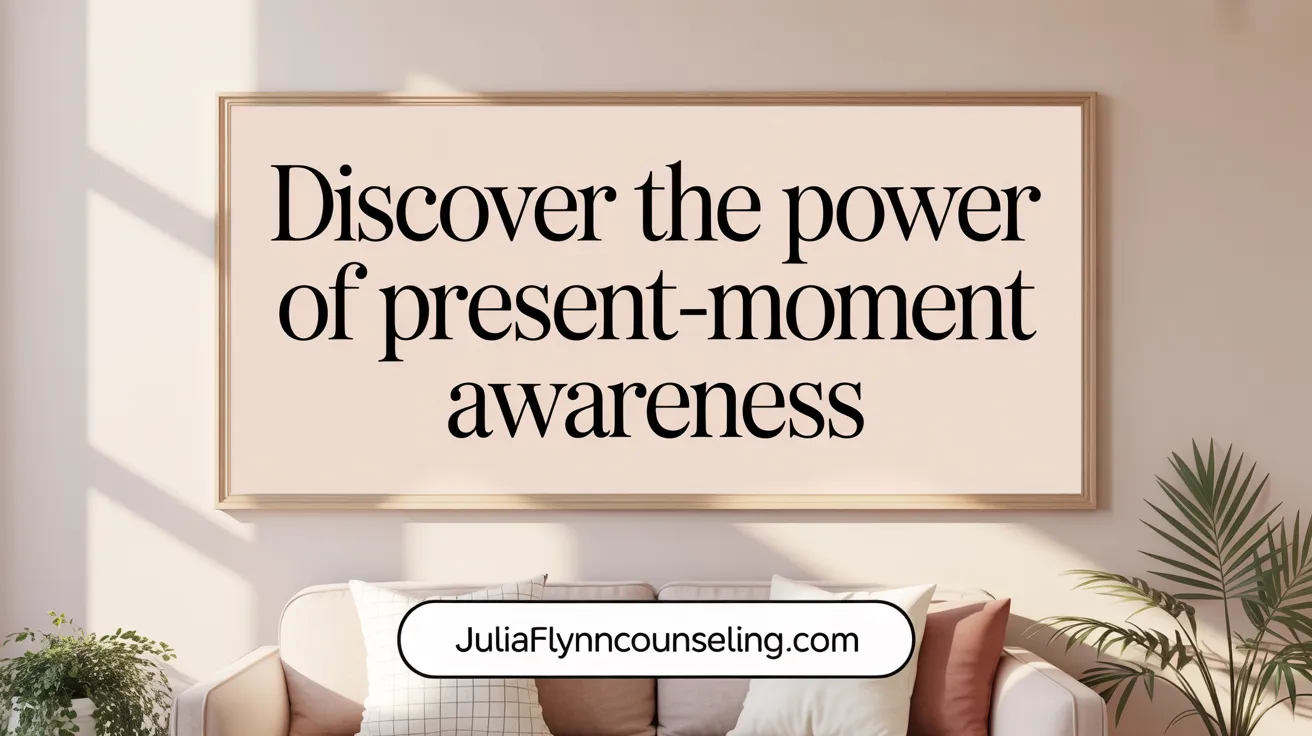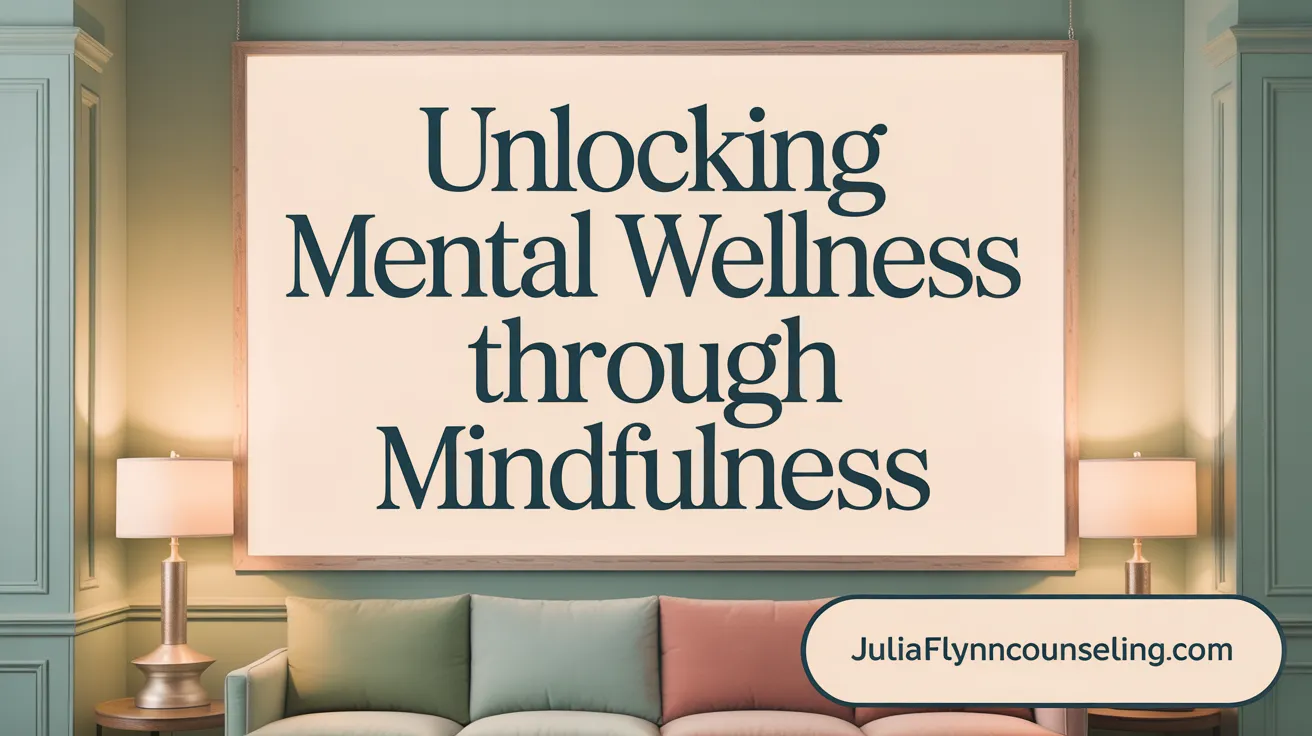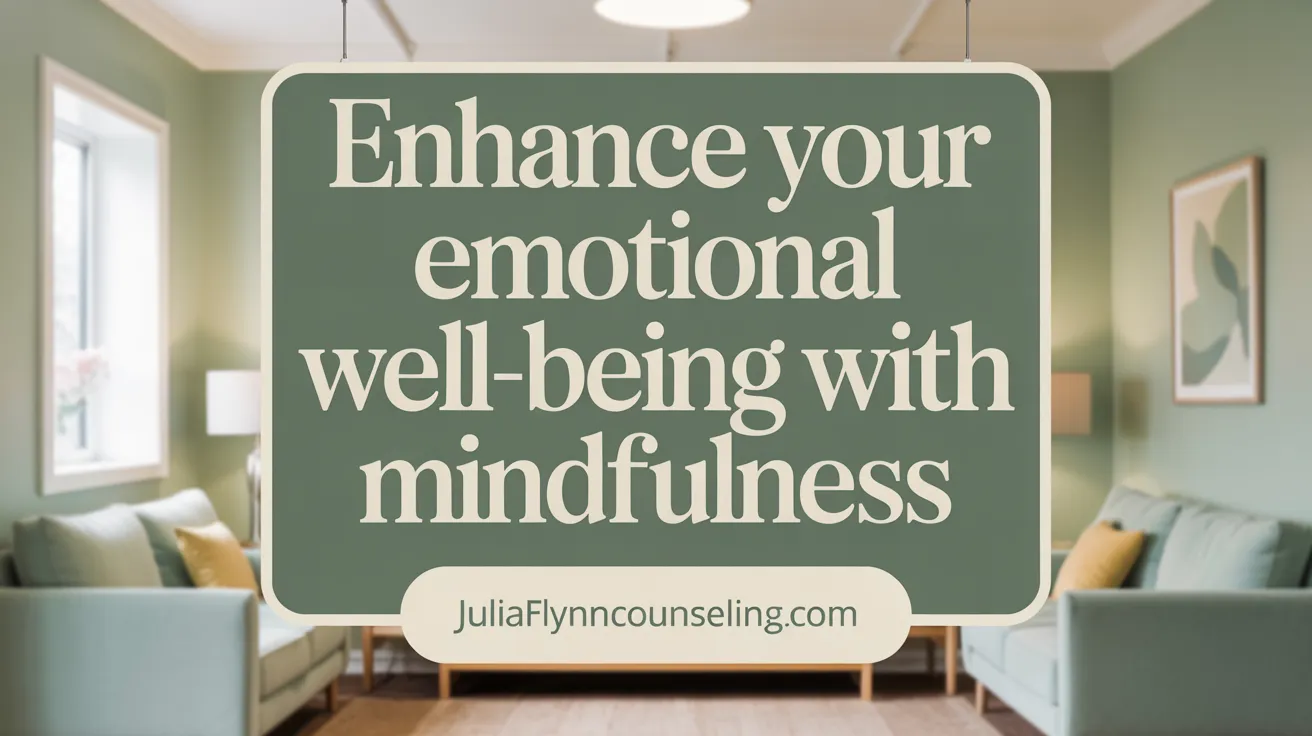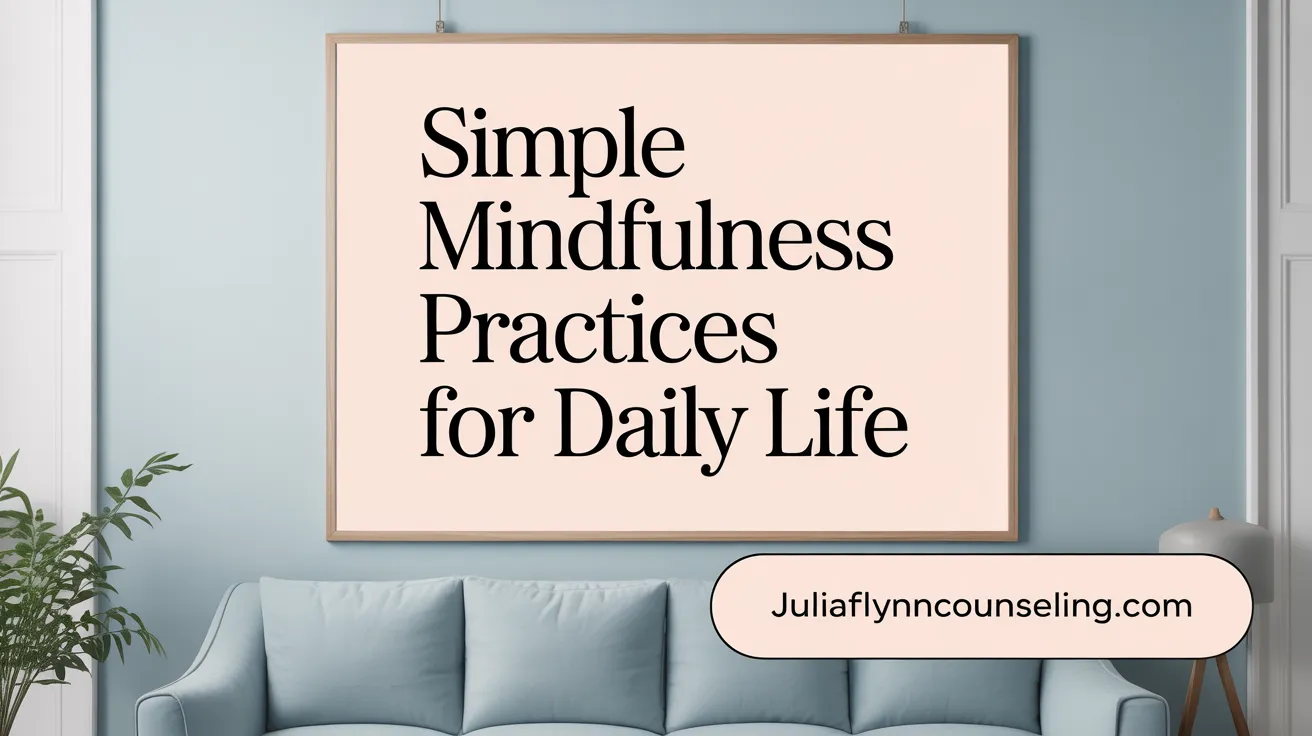Introduction to Mindfulness and Mental Health
What is Mindfulness?
Mindfulness means paying close attention to the present moment with openness and without judgment. It involves observing your thoughts, feelings, body sensations, and surroundings as they happen. This practice helps you become more connected to your experience rather than being lost in the past or worried about the future.
Benefits for Mental Health
Research shows mindfulness can significantly reduce stress, anxiety, and symptoms of depression. It supports emotional regulation, improves sleep quality, and increases overall well-being. By fostering self-compassion and acceptance, mindfulness helps people manage emotions in a healthier way.
Mindfulness Beyond Meditation
While often linked with meditation, mindfulness is not limited to formal sitting sessions. It can be incorporated into everyday life through simple activities such as mindful breathing, observing your surroundings, or paying full attention during routine tasks. This flexibility makes mindfulness an accessible tool for enhancing mental health at any time.
Understanding Mindfulness: Present-Moment Awareness Without Judgment

What is Mindfulness?
Mindfulness is the practice of paying full attention to the present moment, including thoughts, feelings, bodily sensations, and surroundings. It involves being fully engaged in the here and now without distraction or drifting into thoughts about the past or future.
How Does Mindfulness Differ from Meditation?
While often linked, mindfulness and meditation are not the same. Meditation is a structured practice typically involving focused attention sessions, such as sitting quietly and concentrating on breath or an object. Mindfulness, on the other hand, can be practiced anytime and anywhere, by simply bringing awareness to what is happening at that moment (Mindfulness vs Meditation).
The Core Principle of Non-Judgmental Awareness
At the heart of mindfulness is non-judgmental awareness: observing thoughts and feelings as they arise without labeling them as good or bad. This acceptance cultivates self-compassion and helps to break cycles of negative thinking, making emotions easier to manage (Mindfulness and self-compassion.
Mindfulness in Daily Life
Mindfulness can be integrated seamlessly into everyday activities. For example, we can practice mindful breathing, eat attentively by noticing flavors and textures (mindful eating), take mindful walks, or simply pause to observe sensations in the body. These small practices support mindfulness and emotional regulation, reduce stress, and enhance overall wellbeing by fostering presence and connection.
How Mindfulness Enhances Mental Health and Well-Being

Research findings on mindfulness benefits
Mindfulness is widely recognized for its positive impact on mental health. Research has consistently found that practicing mindfulness reduces symptoms of stress, anxiety, and depression. Programs incorporating mindfulness, such as Mindfulness-Based Stress Reduction (MBSR) and Mindfulness-Based Cognitive Therapy (MBCT), have demonstrated effectiveness in enhancing overall psychological well-being, supporting recovery, and preventing relapse in conditions like depression.
Reduction of stress, anxiety, and depression
Engaging in mindfulness exercises helps individuals become more present and aware, which allows for recognition of distress signals and unhelpful thought patterns early on. By observing thoughts and feelings without judgment, people develop self-compassion and emotional acceptance. This process diminishes negative rumination and lessens emotional reactivity, leading to significant reductions in stress, anxiety, and depressive symptoms.
Improvements in emotional regulation and self-awareness
Mindfulness fosters greater self-awareness by increasing attention to internal experiences such as bodily sensations, thoughts, and feelings. This heightened awareness allows for improved emotional regulation, enabling individuals to respond more effectively to challenging emotions and impulses. Mindfulness techniques create a mental space between stimulus and reaction, improving coping strategies for anger, anxiety, and cravings. For further insight, see additional resources on mindfulness and emotional regulation and mindfulness and emotional regulation.
Impact on brain function and neuroplasticity
Scientific studies using neuroimaging reveal that mindfulness meditation induces measurable changes in brain regions responsible for emotion regulation, memory, and learning. Regular mindfulness practice enhances connectivity and thickness in areas like the prefrontal cortex and hippocampus, promoting cognitive flexibility and resilience. These neuroplastic changes contribute to improved mental stability and adaptive responses to stress (Harvard research on mindfulness and brain changes).
Incorporating mindfulness into daily life strengthens mental clarity and resilience, helping individuals navigate emotional challenges with greater ease and fostering sustained mental wellness (How to practice mindfulness).
Mindfulness Techniques and Exercises to Cultivate Present Awareness
What Are Common Mindfulness Exercises?
Mindfulness practices center on paying close attention to the present moment without judgment. Popular exercises include mindful breathing, where attention focuses solely on the breath's rhythm, fostering calmness and clarity.
Body scan exercises guide individuals to observe sensations systematically from head to toe, increasing physical awareness and releasing tension. Mindful eating invites slow, attentive consumption, noting flavors and textures, which improves eating habits and overall presence.
Mindful walking involves focusing on the sensations of each step and surroundings, promoting connection and grounding.
How Does DBT Incorporate Mindfulness?
Dialectical Behavior Therapy (DBT) places mindfulness at its foundation, teaching skills like observing, describing, and participating fully in the moment. It also stresses 'How' skills—engaging one-mindfully with tasks, effectively accomplishing goals, and practicing nonjudgmental acceptance.
These skills help regulate emotions, improve distress tolerance, and enhance interpersonal effectiveness, making mindfulness practical for managing everyday challenges.
What Creative Mindfulness Activities Can Support Practice?
Creative practices such as mindful coloring or drawing allow for sensory engagement and flow, encouraging relaxation and focus. Mindful listening to music or natural sounds centers attention and fosters emotional regulation.
Movement-based mindfulness through yoga, tai chi, or gentle stretches combines body awareness with breath control, supporting mental and physical wellbeing.
How Can Mindfulness Be Integrated Into Daily Routines?
Mindfulness can effortlessly weave into daily life. Simple moments like mindful brushing of teeth, attentive showering, or savoring a mindful cup of tea can cultivate presence.
Setting small reminders throughout the day to pause and breathe, observe surroundings, or notice bodily sensations supports consistent practice. Incorporating short mindfulness sessions, even for a few minutes, increases mental clarity, emotional balance, and resilience over time.
Regular practice, flexibility, and self-compassion are vital to maintain a sustainable mindfulness habit that enhances overall mental health.
Mindfulness in Therapeutic Contexts: Evidence-Based Practices and Integration
What are MBCT and MBSR, and how do they benefit mental health?
Mindfulness-Based Cognitive Therapy (MBCT) and Mindfulness-Based Stress Reduction (MBSR) are structured, evidence-based programs that teach mindfulness skills to help individuals manage mental health challenges. MBCT combines cognitive behavioral therapy techniques with mindfulness to prevent relapse in depression and alleviate symptoms of anxiety and stress. MBSR, often consisting of eight-week courses, focuses on reducing stress and improving overall health through mindfulness meditation, yoga, and body awareness exercises. For more information on Mindfulness-Based Treatments and Mindfulness-Based Cognitive Therapy (MBCT), see these resources.
How does mindfulness contribute to Dialectical Behavior Therapy (DBT)?
Mindfulness serves as the foundational skill in DBT, used to cultivate present-moment awareness and nonjudgmental observation of thoughts and emotions. DBT incorporates mindfulness to enhance emotional regulation, distress tolerance, and interpersonal effectiveness. Through specific skills like observing, describing, and participating mindfully, clients learn to manage intense feelings and reduce impulsive behaviors. Explore DBT mindfulness exercises and techniques for detailed strategies and resources.
How is mindfulness applied in treating depression, anxiety, addiction, and PTSD?
Mindfulness helps individuals stay grounded in the present moment, which disrupts harmful patterns of rumination common in depression. It cultivates acceptance and self-compassion, reducing symptoms of anxiety by fostering patience and nonjudgmental acknowledgment of feelings. Mindfulness-based cognitive therapy is especially effective for recurrent depression. Additionally, mindfulness techniques such as craving labeling assist in managing addiction by helping individuals recognize and tolerate urges without acting on them. Emerging research also supports mindfulness practices in alleviating PTSD symptoms by improving emotional regulation and reducing stress. See Mindfulness for depression treatment, anxiety, and addiction and Mindfulness for PTSD and addiction for more insight.
What support resources are available for mindfulness practice?
Therapeutic support includes guided group mindfulness sessions, which have shown comparable effectiveness to individual therapies like CBT. Many accessible resources are available, including mobile apps, books, online courses, and trusted platforms such as NHS and academic institutional programs. These tools provide exercises like body scans, mindful breathing, and mindful listening, facilitating daily practice and long-term integration of mindfulness into coping strategies. For comprehensive support, visit Mindfulness resources, Guided meditations by UCLA Mindful, and Apps and online mindfulness programs.
Harnessing Mindfulness for Emotional Regulation and Relationship Improvement

How does mindfulness help with anger, impatience, and anxiety?
Mindfulness cultivates present-moment awareness that creates a pause between emotional stimulus and reaction. This space allows individuals to observe their anger or impatience non-judgmentally, preventing impulsive responses. Techniques such as mindful breathing and body scans aid in recognizing physical signs of anger or anxiety, enabling more thoughtful and calm reactions. Practicing mindfulness can thus help to discharge anger safely and manage anxiety by fostering patience and acceptance of uncomfortable emotions. For more details, see mindfulness and emotional regulation.
How can mindful communication improve interpersonal relationships?
Mindful communication involves paying full attention to the person you are interacting with, listening deeply without judgment or distraction. This attentiveness promotes empathy, reduces hostile reactions, and improves understanding, creating a more supportive and connected relationship. Mindfulness practices encourage recognizing and setting boundaries gently, improving conflict resolution and fostering healthier interactions. Consistent mindfulness practice in conversations enhances active listening and emotional presence, key ingredients for relationship satisfaction. Learn more about mindfulness and interpersonal relationships.
In what ways does mindfulness support developing self-compassion and acceptance?
Mindfulness teaches acceptance of thoughts and feelings without criticism, which cultivates self-compassion. This compassionate stance helps individuals acknowledge their struggles kindly rather than with self-judgment. It supports embracing emotions as natural experiences, reducing the weight of negative self-talk. As a result, self-compassion arising from mindfulness practice can improve emotional resilience and encourage a healthier relationship with oneself. For further insight, see Mindfulness and self-compassion.
How does mindfulness break negative thought cycles and reduce emotional reactivity?
Mindfulness fosters awareness of recurring negative thoughts and patterns without engagement or judgment. By observing these thoughts as passing mental events, it becomes easier to disengage from rumination and reduce emotional reactivity. This decentering from distressing thoughts enables individuals to respond more flexibly, instead of reacting automatically. Over time, regular mindfulness practice can diminish the intensity of negative emotions and improve overall emotional regulation. Explore strategies in mindfulness and emotional regulation.
Incorporating Mindfulness into Everyday Life and Self-Care

Practical ways to practice mindfulness outside formal meditation
Mindfulness isn't limited to sitting quietly—it can be woven into everyday moments. Paying attention deliberately to your breath, bodily sensations, or surroundings helps keep you grounded without needing a formal meditation session. For more on practicing mindfulness outside formal meditation and mindfulness awareness, see these resources.
Mindfulness during routine activities like eating, walking, and driving
Engaging fully in daily routines cultivates mindfulness. While eating, focus on the tastes, textures, and smells, noticing hunger and fullness cues. Mindful walking involves feeling each step and observing your environment without distraction. Even driving can be a moment for awareness by noticing your breath, body posture, and road noises. Explore mindful eating and mindful walking exercises for detailed techniques.
Short mindfulness breaks and one-minute meditation
Brief pauses during busy days can center the mind. Simple exercises like a one-minute focus on your breathing or sensory awareness during short breaks help reduce stress and refresh focus. These small doses can be especially helpful in managing emotional overload and maintaining clarity. Learn more about one-minute meditation exercises and short mindfulness practices and guided meditation techniques.
Using nature, art, and sensory experiences to cultivate mindfulness
Connecting with natural environments by observing trees, feeling the breeze, or listening to birds promotes calmness and presence. Activities involving art, such as mindful coloring or gazing meditation on a candle flame, encourage sustained attention and invite emotional regulation. Engaging the senses through smells, sounds, or textures further deepens mindfulness practice. Check out mindfulness exercises involving nature and sensory activities and mindfulness activities through art and mindful hobbies.
Considerations and Support for Mindfulness Practice

Who is mindfulness suitable for?
Mindfulness practice is broadly accessible to many individuals seeking support for stress, anxiety, depression, or general mental well-being. It can enhance self-awareness, mindfulness and emotional regulation, and foster self-compassion. However, mindfulness may not be appropriate for everyone, especially in certain sensitive situations (When mindfulness is not suitable.
What limitations and cautions should be considered?
Mindfulness is not recommended for some people during recent bereavement or acute stressful events, as the practice might intensify distress in vulnerable moments. Those experiencing manic episodes, self-harm urges, or suicidal thoughts should approach mindfulness with caution, as certain exercises might trigger difficult feelings or thoughts (Limitations of mindfulness).
Why consult healthcare professionals?
Before starting mindfulness, particularly if you have severe mental health challenges, trauma, PTSD, or complex emotional issues, it’s important to consult a healthcare professional. They can help assess your suitability and guide you toward the most supportive mindfulness practices or alternative therapies tailored to your needs (How to practice mindfulness.
What resources support mindfulness practice?
To develop and maintain consistent mindfulness habits, various resources are available:
- Structured programs like Mindfulness-Based Cognitive Therapy (MBCT) and Mindfulness-Based Stress Reduction (MBSR)
- Guided meditation apps and online courses from reputable institutions such as NHS, UCLA Mindful, or Oxford Mindfulness
- Books, videos, and worksheets tailored to both beginners and experienced practitioners (Mindfulness resources)
Utilizing these resources, along with professional guidance when needed, ensures mindfulness is practiced safely and effectively, maximizing its mental health benefits (Benefits of mindfulness).
Conclusion: Embracing Mindfulness to Foster Mental Health and Resilience
Embracing Mindfulness to Foster Mental Health and Resilience
Mindfulness is a powerful practice that involves being fully present and aware of our thoughts, feelings, and surroundings without judgment. Research shows that regular mindfulness practice can reduce stress, anxiety, and depression while improving emotional regulation, sleep quality, and overall wellbeing.
Making mindfulness a part of everyday life—through exercises like mindful breathing, body scans, or mindful walking—can foster self-compassion and help break habitual negative thought patterns. These simple practices promote mental clarity and resilience, enabling us to respond to life’s challenges more calmly and effectively.
Whether used alone or alongside therapies like Cognitive Behavioral Therapy or Dialectical Behavior Therapy, mindfulness serves as a versatile tool to enhance mental health for people of all ages and backgrounds. Starting with just a few minutes daily can make a meaningful difference, encouraging a kinder relationship with ourselves and a more connected, fulfilling life.
